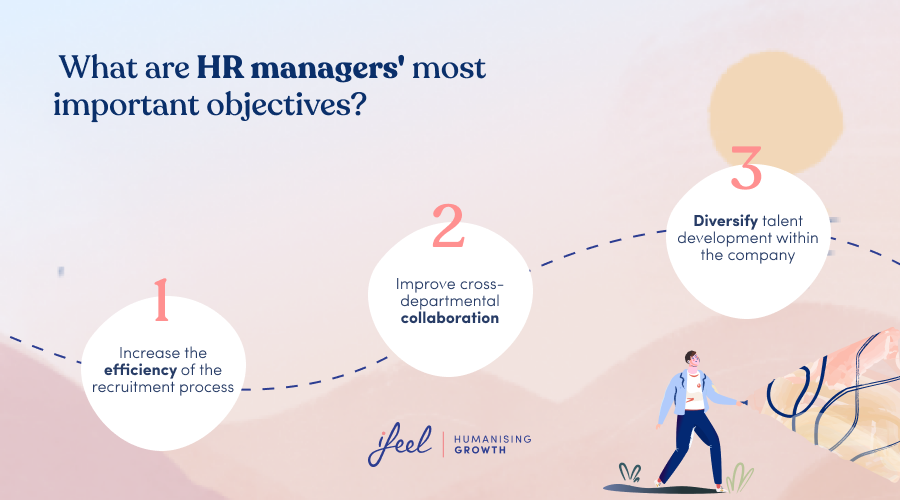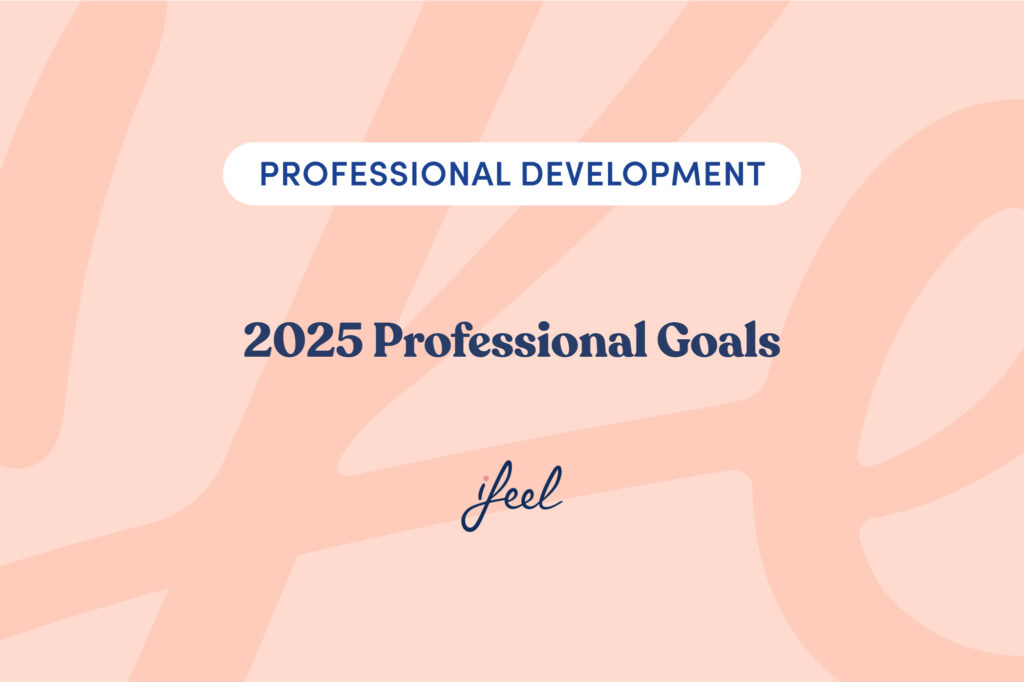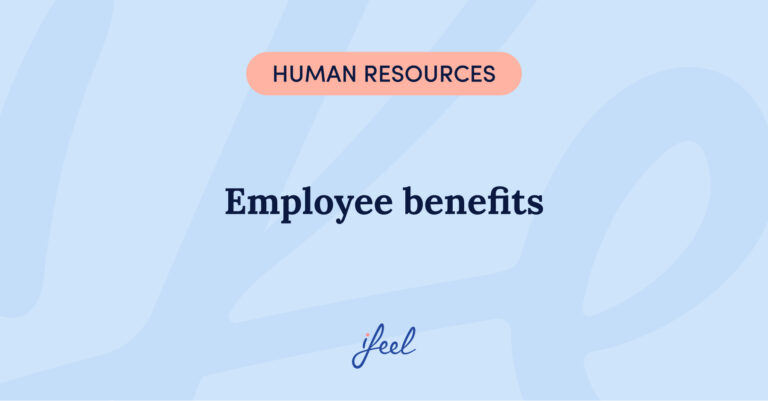As HR leaders and decision-makers, you understand the critical role of professional goal-setting in an organisation’s success. Yet, why do so many strategies fall short? Beyond the need for realistic goals, it is crucial for them to be measurable, specific, meaningful, and aligned with a timeline.
Challenges emerge when goals are ambiguous, overly ambitious, or significant, leading to inconsistency and a lack of commitment. This often results in missed opportunities or delayed achievements. Setting professional goals indicates a commitment not only to personal growth but also to the future of the organisation.
How are your current strategies for setting and achieving professional goals meeting the demands of your employees and aligning with organisational objectives?

How to set your professional goals properly
The definition of different professional goals is part of the ongoing review of our professional project, which is something more general and abstract than concrete goals for a specific year. This definition can be done whether we are actively looking for a job or if the plan is to stay within our current line of work but we want to give it a slight twist or take steps to revitalize it.
Here are 6 suggestions for setting professional goals for 2025 that are feasible and meaningful.
| How to set your professional goals properly | |
| 1. | Reflect upon your motivation |
| 2. | Set your professional goals apart from those your company has for you |
| 3. | Optimise your strategy |
| 4. | Distinguish between goals and actions |
| 5. | Build a good hierarchy of objectives |
| 6. | Be open-minded about your career goals |
1. Reflect upon your motivation
When designing your strategic professional goals for 2025, leave some room for reflection: why are you considering these goals? Why now?
These types of questions can take a long time to answer unless you are very clear about your professional goals for the new year.
Just think about it, let them roam around in your mind. Giving them some answers, even if tentative, will help you connect the goals you set with your personal needs and motives at this moment.
2. Set your professional goals apart from those your company has for you
Your objectives and those of your company do not necessarily have to align. The common approach, especially in relatively large companies, is for managers to jointly analyze with their team members the objectives they have set for the next period established: these are the official, explicit objectives, in agreement with the organization.
However, each employee can initiate this healthy internal competition with themselves and ask what they need or what they would like to change as an employee. Even if they never share it with their manager or colleagues, or if the content is only something that does not involve anyone else, they can do so internally.
3. Keep it simple and necessary
Your career goals for 2025 don’t have to be too many or too few, complex or simple: they have to be yours, the ones that make sense for your career right now.
Some may be more long-term in nature (e.g., improving your English language skills). Others can be achieved on an ongoing basis, as you go along (for example, arriving on time every day, or not eating in front of your computer). Sometimes small changes can have significant results in terms of psychological well-being, even if at first they may not seem like a big deal: “I will leave every day on time, not later” can be a great and simple example of a professional goal.
4. The distinction between professional goals and actions
Of course, sometimes the actions to be performed are already an objective in themselves, but at other times it is convenient to differentiate things to be more organized.
For example, an employee may set “devote only as much time to work as necessary” as a professional goal. That is the objective, but how will they put it into practice? By implementing it in concrete actions. For example, “Do not schedule meetings after a certain time” or “Do not check your corporate email outside of working hours” are two actions that will help you achieve your goal.
5. Build a good hierarchy of objectives
You may be wondering if you should set a lot of objectives, if any goal is valid for your 2025 career strategy, or if you should be cautious and be selective.
In reality, the question is not whether your list of professional goals has one goal or fifteen. The important thing is that the goals you set for yourself are feasible and that you are well prepared when setting them.
Once you have your initial project, stop and think about which of the things you have planned to implement are really important and which are secondary, so that you can decide what resources to invest in each one. Also, think about which ones are in your hands alone and which ones you will need to count on the collaboration of others.
A third axis can be the calendar: perhaps not all the objectives you have set are meant to start at the beginning of January, their timing might be later on in the year. Taking into account these criteria and any others you may have to consider, start working on them.
6. Be open-minded about your professional objectives
Think things through but do not be too solemn. It is clear that every decision we make at any given moment affects future decisions, results, etc., whether we are aware of it and can trace it or whether we never find out about it or evaluate it. This should lead us to be careful and reflective when we set our professional goals, but we must also counterbalance it with the idea that life takes many turns, everything is temporary and we cannot measure, anticipate or control all the variables.
The life of real human beings is not an excel table or an algorithm. We must leave room for fluidity, spontaneity, and openness to experience when opting for certain paths. A structured professional project is not a robotic project, nor a sealed space.
Key objectives for HR leaders
HR managers are also employees of the company. Therefore, they have individual professional goals set by their managers or privately by themselves. In addition, one of their most important functions is to establish at the beginning of the year – and then supervise – their own department’s performance objectives, as well as to guide the rest of the team with their own goals.

To help them with this task, we at ifeel have prepared an OKR guide for HR managers for the coming year. This document will be very useful for them to take care of their teams, using it as a powerful tool to complement the professional objectives they have already set.
Each HR manager must design their OKRs strategy according to the company’s characteristics. Here are three examples of professional goals that will be highly sought after in 2025 in HR management departments.
1. Increasing the efficiency of selection processes
Large companies always have selection processes in place, but often, haste, poor information management, or a methodology that is not very up-to-date generate inefficiencies. When this happens, finding candidates for a specific position is difficult, or there are premature dropouts that reopen the process and generate a large expenditure of resources.
When it comes to setting this professional objective quantitatively, you can think, for example, of shortening the duration of the current selection processes by looking at the rate of dropouts during the probation period and the rate of job rotation that you had in 2022.
2. Improve interdepartmental collaboration
Effective internal communication and a collaborative corporate culture are fundamental for any company to achieve the results it wishes to obtain and stand out from its competitors. The more complex the structure of an organization, the more effort is required to ensure that the different departments work in harmony to achieve this level of efficiency.
This OKR can be operationalized in terms of interdepartmental meetings, activities that allow members of different departments to become familiar with other areas of the company, and even through team-building strategies.
3. Diversify talent development within the company
In an extremely complex and competitive world of work, it is essential to identify different professional profiles, integrate them into the company and develop them so that they can make the company shine while they continue to learn.
Human resources managers must consider this when planning their key results regarding internal training programs, career development, and the approach to the job offers they publish.
“Finding ifeel as a partner who could provide us with value wherever our team is and at whatever time, was a great discovery.”
Risk assessment through SOFAS assessment
Discover how workplace mental health impacts productivity with insights from the “Risk Assessment through SOFAS Test” report! This study evaluates employees’ social and occupational functioning in therapy, revealing critical trends in mental well-being.
While most employees are functioning near optimal levels, the report highlights a critical 3.5% of high-risk individuals experiencing severe impairments in their work and personal lives. These findings emphasise the need for proactive mental health interventions to safeguard your workforce’s performance and well-being.
Don’t miss out! Download the full report to uncover actionable strategies for boosting employee resilience and productivity.
The Leadership Lens🔎
Leadership involves not just steering the ship but ensuring every crew member knows their destination and understands how their efforts contribute to the collective success. Leaders must articulate the vision clearly and ensure that professional goals at every level reflect the company’s strategic priorities. This alignment ensures that individual efforts accumulate into significant organisational achievements.
Mental well-being for enterprises
Setting professional goals is pivotal for both individual growth and organisational success. By ensuring that goals are specific, measurable, and aligned with the company’s strategic vision, employees can better contribute to achieving broader objectives.
At ifeel, we understand that it is not possible to take care of the company without taking care of the psychological well-being of its employees. To do so, we have a mental well-being program for companies, designed by our team of occupational well-being psychologists with one main objective: to help companies place employee health at the center of their strategy to build their mission statement.
Thanks to this partnership, the people in charge of HR departments can receive personalized, data-driven advice on how to make good decisions in a company to get the most out of the teams they are in charge of and take better care of the psychological well-being of the people in them.
Moreover, this program offers employees a holistic mental health care service structured at different levels according to their needs. This service includes, if required, online psychological therapy with a psychologist specialized in cases like theirs. Try our program today so you can see how it could help you.
We hope you found this post about setting your professional goals in 2025 useful. If you want more information about our mental well-being program for companies, simply request it, and we will contact your team as soon as possible.











